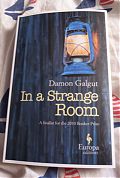
Damon Galgut
In a Strange Room
The exquisiteness of In a Strange Room was apparent from the beginning. It is a passionately human book, it lacks pretensions. I felt the need of expression behind its writing, which Rainer Maria Rilke says is the cornerstone of good art. And Damon Galgut’s voice is so honest, a characteristic I greatly admire.
Perhaps I enjoyed In a Strange Room most because of its subject matter: travelling. And I liked it even better for the switches between first and third person narration and the overall grammatical simplicity—Galgut employs only commas and periods and only when necessary. In interviews, Galgut relates how his book became classified as fiction when it was originally serialized in The Paris Review, for it wanders a very thin line of autobiography. But fiction it surely is, a flight of literary fancy.
Because of the third/first person switches, the reader is brought as close as a reader can go into the narrator’s story; like the writer, the reader stands outside of the character, watching, conscious of standing besides the writer and occasionally getting inside the writer’s head. I loved it! At points of high drama and self-questioning, the first person carried an immediacy that would otherwise be lacking.
Looking back at him through time, I remember him remembering, and I am more present in the scene than he was. But memory has its own distances, in part he is me entirely, in part he is a stranger I am watching.
Yet In a Strange Room is filled with distances: distance between the present and memory and distance between people, relationships. The three parts—The Follower, The Lover, The Guardian—sketch three people encountered while travelling and three forms of relationships. This all sounds rather clever, I guess, but the book never comes off that way, it is too conscious of itself, too much a book that is being written.
There are also the distances that come while travelling that Galgut illustrates better than I have ever read. The wanderer wanders, never completely at the center, always a little apart.
Too much travelling and placelessness have put him outside everything, so that history happens elsewhere, it has nothing to do with him. He is only passing through. Maybe horror is felt more easily from home. This is both a redemption and an affliction, he doesn’t carry any abstract moral burdens, but their absence is represented for him by the succession of flyblown and featureless rooms he sleeps in, night after night, always changing but somehow always remains the same.
And that’s all I’m going to write about In a Strange Room. This is one of those books that I want you, dear reader, to discover (mostly) for yourself.
· · · · · · · · · · · · · · · · · · · ·